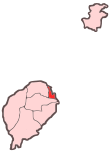 São Tomé and Príncipe (/ˌsaʊ təˈmeɪ ... ˈprɪnsɪpə, -peɪ/ ⓘ SOW tə-MAY ... PRIN-sih-pə, -pay; Portuguese: São Tomé e Príncipe (Portuguese pronunciation: [sɐ̃w tuˈmɛ i ˈpɾĩsɨpɨ]); English: "Saint Thomas and Prince"), officially the Democratic Republic of São Tomé and Príncipe (Portuguese: República Democrática de São Tomé e Príncipe), is an island country in the Gulf of Guinea, the western equatorial coast of Central Africa. It consists of two archipelagos around the two main islands of São Tomé and Príncipe, about 150 km (93.21 mi) apart and about 250 and 225 km (155 and 140 mi) off the northwestern coast of Gabon. With a population of 201,800 (2018 official estimate), São Tomé and Príncipe is the second-smallest and second-least populous African sovereign state after Seychelles. It is also the smallest Romance-speaking country outside of Europe in terms of population and area. The islands were uninhabited until their discovery in 1470 by Portuguese explorers João de Santarém and Pedro Escobar. Gradually colonized and settled throughout the 16th century, they collectively served as a vital commercial and trade centre for the Atlantic slave trade. The rich volcanic soil and proximity to the equator made São Tomé and Príncipe ideal for sugar cultivation, followed later by cash crops such as coffee and cocoa; the lucrative plantation economy was heavily dependent upon enslaved Africans. Cycles of social unrest and economic instability throughout the 19th and 20th centuries culminated in peaceful independence in 1975. São Tomé and Príncipe has since remained one of Africa's most stable and democratic countries. According to 2023 V-Dem Democracy indices São Tomé and Príncipe is ranked 56th electoral democracy worldwide and 5th electoral democracy in Africa. São Tomé and Príncipe is a developing economy with a medium Human Development Index. (Full article...) Selected article - The Community of Portuguese Language Countries (Portuguese: Comunidade dos Países de Língua Portuguesa; abbr. : CPLP), also known as the Lusophone Community (Portuguese: Comunidade Lusófona), is an international organization and political association of Lusophone nations across five continents, where Portuguese is an official language. The CPLP operates as a privileged, multilateral forum for the mutual cooperation of the governments, economies, non-governmental organizations, and peoples of the Lusofonia. The CPLP consists of 9 member states and 33 associate observers, located in Europe, South America, Asia, Africa and Oceania, totaling 38 countries and 4 organizations. The CPLP was founded in 1996, in Lisbon, by Angola, Brazil, Cabo Verde, Guinea Bissau, Mozambique, Portugal, and São Tomé and Príncipe, nearly two decades after the beginning of the decolonization of the Portuguese Empire. Following the independence of Timor-Leste in 2002 and the application by Equatorial Guinea in 2014, both of those countries became members of the CPLP. Macau (a Special Administrative Region of China), Galicia (an Autonomous Community of Spain), and Uruguay are formally interested in full membership and another 17 countries across the world are formally interested in associate observer status. (Full article...)This is a Good article, which meet a core set of high editorial standards.
São Tomé and Príncipe competed at the 2004 Summer Olympics in Athens, Greece, which was held from 13 to 29 August 2004. The country's participation at Athens marked its third appearance in the Summer Olympics since its debut in the 1996 Summer Olympics. Two track and field athletes, Yazaldes Nascimento and Fumilay Fonseca, were selected to represent the nation via wildcards, as the nation had no athletes that met either the "A" or "B" qualifying standards. Fonseca was selected as flag bearer for the opening ceremony. Fonseca was also notable for becoming the youngest ever athlete to represent São Tomé and Príncipe at the Summer Olympics, aged 16 years and 92 days. This is a record which still stands today. (Full article...)CategoriesDid you know -
Selected picture -In the news
Things to do
Topics– Districts –
Related portalsAssociated WikimediaThe following Wikimedia Foundation sister projects provide more on this subject:
Discover Wikipedia using portals |










































